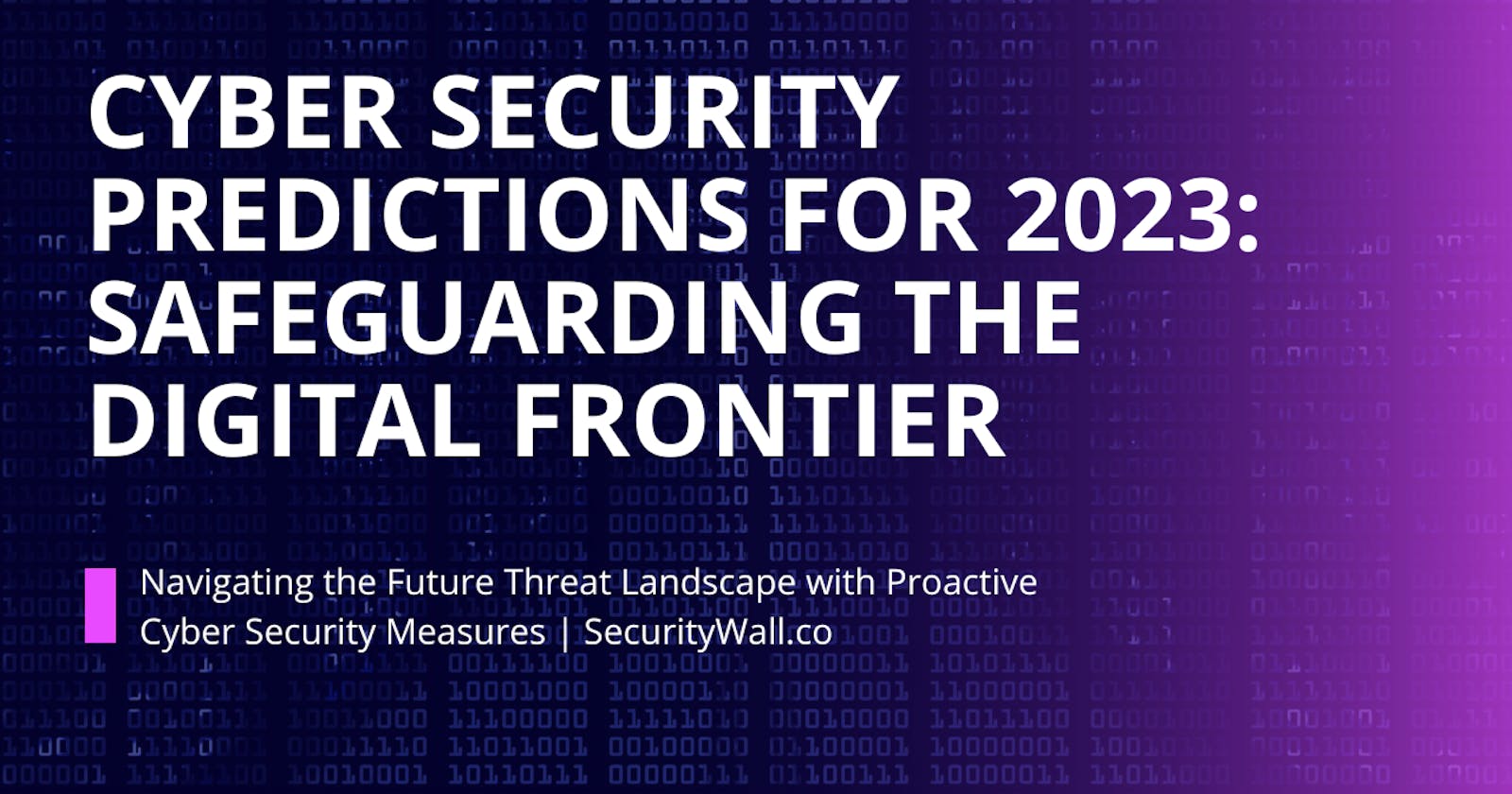Cyber Security Predictions for 2023: Safeguarding the Digital Frontier
Navigating the Future Threat Landscape with Proactive Cyber Security Measures
The rapidly evolving digital landscape brings both immense opportunities and unprecedented risks. Cybercrime is growing exponentially. According to reports, the cost of cybercrime is predicted to hit $8 trillion in 2023 and will grow to $10.5 trillion by 2025. As we enter 2023, the need for robust cybersecurity measures becomes more critical than ever. Threat actors are continually devising new techniques to exploit vulnerabilities and compromise sensitive information. In this article, we delve into the realm of cyber security and present key predictions for 2023, outlining the emerging trends and challenges that organizations and individuals should be prepared to face.
AI-powered Cyber Attacks: The year 2023 will witness an upsurge in cyber attacks leveraging artificial intelligence (AI) and automated computer-generated algorithms. Threat actors will employ sophisticated techniques to automate attacks, evade traditional defense mechanisms, and exploit vulnerabilities at an unprecedented scale. Organizations must invest in advanced threat-hunting mechanisms not limited to AI-powered security solutions but in-house analysis to detect and counteract these evolving threats.
The Evolution of Auditing and Penetration Testing: In 2023, the importance of auditing and penetration testing will be paramount in the battle against cyber threats. These proactive measures involve assessing an organization's digital infrastructure, identifying vulnerabilities, and simulating real-world attack scenarios to gauge the effectiveness of existing security measures. With cyber criminals constantly innovating, auditing and penetration testing serve as crucial components of a comprehensive defense strategy.
Zero-Trust Architecture as the New Standard: The traditional perimeter-based security approach will no longer suffice in 2023. The concept of Zero-Trust Architecture will gain prominence, where trust is never assumed, and every access request is continuously authenticated and authorized. Organizations will increasingly adopt this model, implementing strict identity and access management (IAM) controls, multi-factor authentication (MFA), and continuous monitoring to prevent unauthorized access.
Heightened Focus on Supply Chain Security: The SolarWinds and Colonial Pipeline incidents in recent years exposed the vulnerabilities present in global supply chains. In 2023, there will be a significant emphasis on enhancing supply chain security. Organizations will implement stringent measures to vet third-party vendors, perform thorough risk assessments, and establish robust incident response plans to minimize the potential impact of supply chain attacks.
Expansion of Cybersecurity Regulations: Governments and regulatory bodies around the world will continue to strengthen cybersecurity regulations in 2023. The focus will be on ensuring data privacy, protecting critical infrastructure, and holding organizations accountable for security breaches. Compliance with regulations such as the General Data Protection Regulation (GDPR), SOC-1, SOC-2, ISO 27001, and the California Consumer Privacy Act (CCPA) will become a top priority for businesses, requiring extensive security measures and incident reporting capabilities.
Growing Threats to Internet of Things (IoT) Devices: As the adoption of IoT devices expands, so does the attack surface for cyber criminals. In 2023, we anticipate an increase in cyber attacks targeting IoT infrastructure, including smart homes, healthcare devices, and industrial systems. The lack of standardized security protocols in many IoT devices makes them vulnerable. Organizations and individuals must prioritize securing IoT ecosystems by implementing strong authentication, encryption, and regular firmware updates.
Enhanced Role of Threat Intelligence: The reliance on threat intelligence to proactively identify and mitigate cyber threats will become more critical in 2023. Threat intelligence platforms and services will play a pivotal role in aggregating and analyzing data from diverse sources, providing organizations with actionable insights to strengthen their defenses, especially malware attacks. Collaboration and sharing of threat intelligence among industries and organizations will also become essential to stay ahead of evolving threats.
Identifying Undiscovered Vulnerabilities: Auditing and penetration testing provide organizations with valuable insights into potential vulnerabilities present in their systems. By thoroughly examining network infrastructure, application security, and cloud environment (Azure, GCP, AWS, etc). Additionally, 3rd party auditors and penetration testers can pinpoint weaknesses with real-time hacker approach that may be missed by the internal security team and can be exploited by malicious actors. Regular 3rd party and comprehensive audits enable businesses to identify and test their infrastructure from a 3rd party angle and hack before get hacked, reducing the risk of breaches and data compromises.
Conclusion: In 2023, the cyber security landscape will witness significant advancements, demanding constant vigilance and proactive measures to safeguard digital assets. Organizations and individuals must remain adaptable and prepared to counter the evolving threat landscape by adopting advanced technologies, implementing robust security frameworks, and fostering a culture of cyber security awareness. By staying ahead of the curve, we can fortify our digital frontier and ensure a safe and secure digital future. It is crucial that businesses prioritize auditing and penetration testing as critical component of their cyber security strategy to identify vulnerabilities, simulate real-world attacks, and enhance incident response preparedness. By investing in these measures, organizations can stay ahead of the curve, protect sensitive data, and maintain the trust of their customers, stakeholders, and partners in an increasingly interconnected world.
Defend Cyber Security Challenges with SecurityWall
With our industry expertise and cutting-edge technologies, we assist organizations in navigating the evolving threat landscape. Our comprehensive audits and penetration testing enable us to identify vulnerabilities, simulate real-world attacks, and develop effective incident response strategies. By leveraging our services, clients can proactively address security gaps, enhance their defenses, and stay one step ahead of malicious actors and Safeguard your Digital Frontier.
Read about: Enhance Your Cybersecurity with SecurityWall: Pakistan Telecom Authority's Approved Cybersecurity Audit Firm

